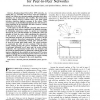Free Online Productivity Tools
i2Speak
i2Symbol
i2OCR
iTex2Img
iWeb2Print
iWeb2Shot
i2Type
iPdf2Split
iPdf2Merge
i2Bopomofo
i2Arabic
i2Style
i2Image
i2PDF
iLatex2Rtf
Sci2ools
127
click to vote
TPDS
2008
2008
DCMP: A Distributed Cycle Minimization Protocol for Peer-to-Peer Networks
Abstract-- Broadcast-based Peer-to-Peer (P2P) networks, including flat (e.g., Gnutella) and two-layer super-peer implementations (e.g., Kazaa), are extremely popular nowadays due to their simplicity, ease of deployment and versatility. The unstructured network topology, however, contains many cyclic paths which introduce numerous duplicate messages in the system. While such messages can be identified and ignored, they still consume a large proportion of the bandwidth and other resources, causing bottlenecks in the entire network. In this paper we describe DCMP, a dynamic, fully decentralized protocol which reduces significantly the duplicate messages by eliminating unnecessary cycles. As queries are transmitted through the peers, DCMP identifies the problematic paths and attempts to break the cycles, while maintaining the connectivity of the network. In order to preserve the fault resilience and load balancing properties of unstructured P2P systems, DCMP avoids creating a hierarchical ...
Related Content
| Added | 15 Dec 2010 |
| Updated | 15 Dec 2010 |
| Type | Journal |
| Year | 2008 |
| Where | TPDS |
| Authors | Zhenzhou Zhu, Panos Kalnis, Spiridon Bakiras |
Comments (0)

